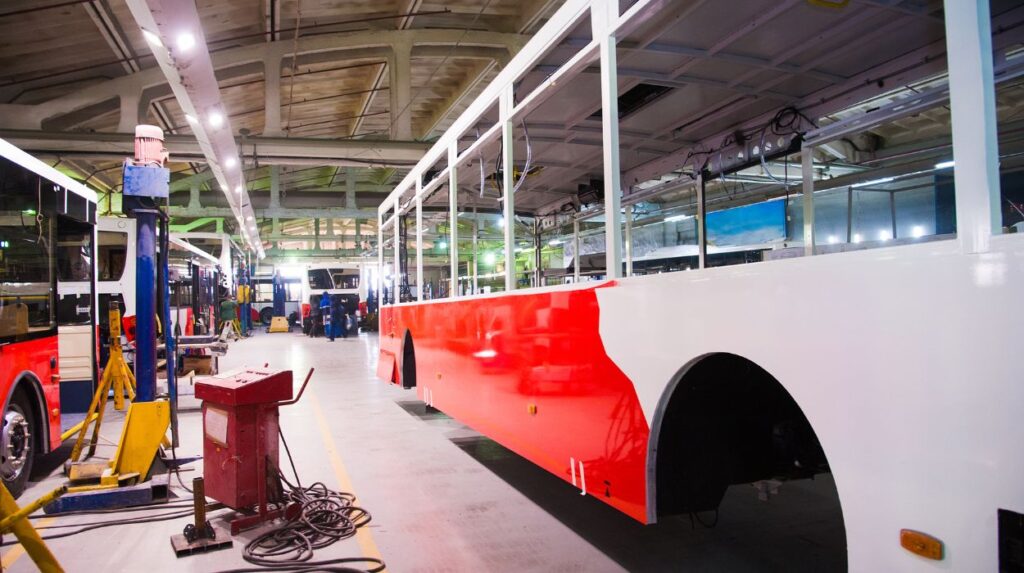India is gradually warming up to clean transportation to cut pollution and reliance on fossil fuels, especially electric vehicles. Under the FAME (Faster Adoption and Manufacturing of Hybrid and Electric Vehicles) scheme of the government, the use of electric buses continues to grow in main cities including Delhi, Mumbai, Bengaluru, and Hyderabad. Despite the call for the electrification of public transport, it has the benefit of minimizing emissions while offering a cheaper way to expand mass transport.
Local manufacturers are no longer idle and many have already started coming up with new efficient and environmentally friendly technologies. This increase in local production is necessary to meet the dream of selling electric vehicles in India employment generation, and the cost necessary to localize electric vehicle technology. Now let us discuss the major operating of the best electric bus manufacturers in India along with their offerings, propositions, and contributions toward a cleaner public transport system in India.
Career Opportunities for Electronic Buses
Electric buses are more eco-friendly than conventional diesel buses; electric buses are an essential innovation for the Indian transport system. These buses emit no tailpipe emissions – which decreases air pollution in congested areas and benefits public health. Electric buses not only provide an answer to the increasing air pollution problems as well as the population density of large cities, but they also help to decrease the carbon emissions of the country.
They are even more silent than diesel buses, reducing noise pollution which is especially common in cities. Their low maintenance requirements and their use of renewable resources also contribute to their advantage as being cheaper and more efficient items to use. The Indian government has indeed planned large sums to extend the market for EV buses; the recently declared ₹4,391 crore outlay for procuring more than 14,000 electric buses in highly polluted cities including Delhi and Mumbai.
By reducing the use of fossil energy and promoting the targets of climate change under the Paris Agreement, India is getting closer to making electric buses faster. They are a step toward the improvement of the ecological situation, transportation safety, and efficiency of urban transport. With electric buses being operationalized, India stands positioned to enter into a new form of green public transport future that promises to eliminate barriers of environmental and economic forms.
Comparison Table of Top Electric Bus Manufacturers in India
| Manufacturer | Year Established | No. of Models | Key Partnership | Notable Features |
| Switch Mobility | 2014 | 7 | Ashok Leyland | Largest model range, double-decker option |
| Tata Motors | 2019 | 3 | None | Extensive service network, affordable |
| Electra Greentech | 2000 | 4 | BYD Co. | Pioneers in EV, strong battery tech |
| JBM Auto | 1983 | 4 | MUON India | High-production, eco-friendly models |
| PMI Electro Mobility | 2017 | 5 | None | Large urban presence, high-range buses |
| Erisha Mobility | 2022 | 4 | None | Rapid expansion, a diverse range |
| BYD Auto | 2013 | 4 | Electra | High-efficiency, durable chassis |
| Volvo Group | 1927 | 2 | None | Global expertise, robust urban buses |
| Ashok Leyland | 2018 | 2 | SUN Mobility | Swappable batteries, quick recharging |
| Eka Mobility | 2019 | 1 | Pinnacle | Low TCO, sustainable design |
Top Electric Bus Manufacturers in India
1. Switch Mobility
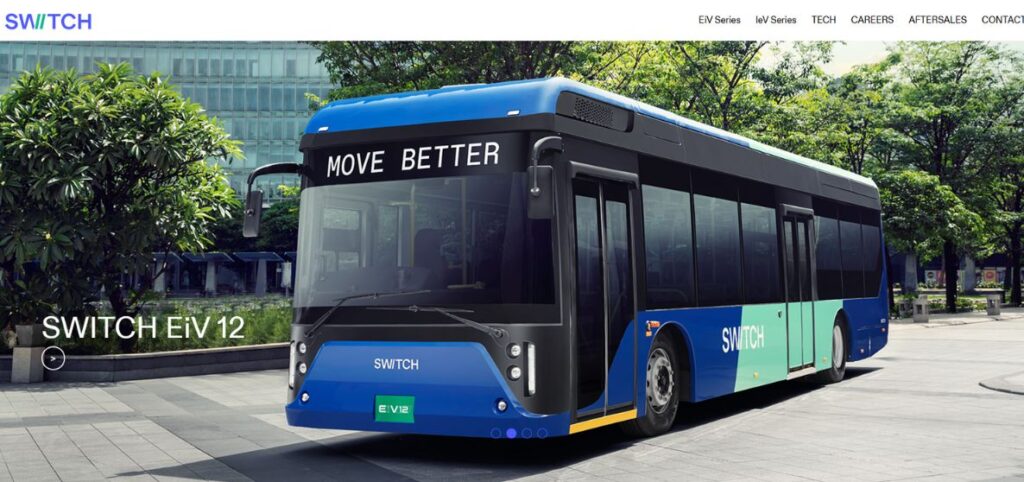
Switch Mobility, a Hinduja group company, is a market leader in electric buses in India with many environmentally friendly models. Switch is the newest addition to Ashok Leyland’s fleet, the result of a joint venture with British bus manufacturer Optare Plc, and is specifically dedicated to sustainability. These models include the SWITCH EiV 22, the double-decker bus for city transport, and the EiV Series for intercity, airport transportation.
Key Features:
- Largest electric bus model range in India
- Expertise in city, intercity, and double-decker buses
- Partnership with Ashok Leyland, leveraging strong distribution
- EiV series includes models like EiV 12 and India’s first double-decker electric bus
Popular Models:
SWITCH e1, EiV 12, EiV 22, Metrodecker, Solo
2. Tata Motors
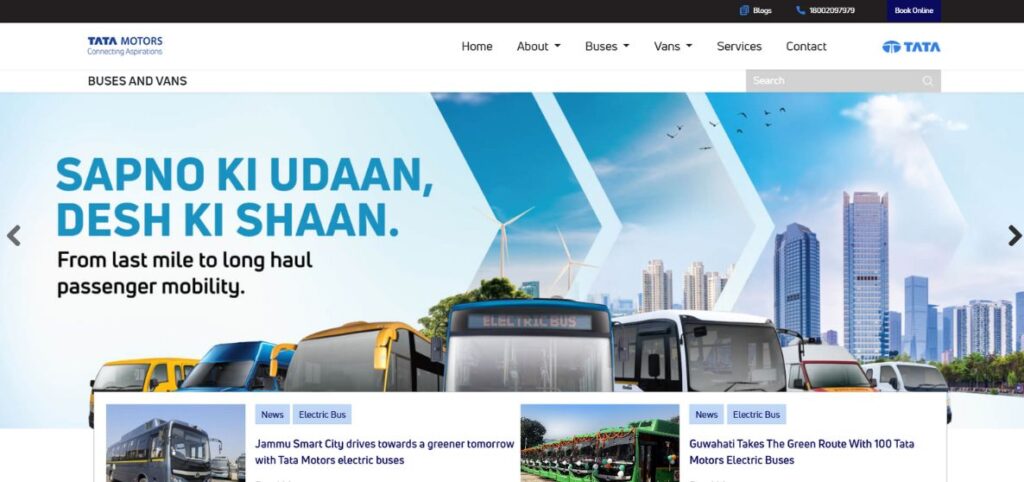
India’s leading automobile company, Tata Motors has also begun to make large-scale progress in electric buses. As a company that has benefited from a strong reputation for quality and innovation, Tata currently supplies several electric models, including the Ultra and Starbus series for environmentally friendly urban transport. From 9 meters to 12 meters in length, Tata has offered various choices targeting city and intercity transportation in India to introduce clean transportation.
Key Features:
- Provides a variety of models appropriate for urban and intercity travel
- Well-established service network and standard reliability
- Reliable designs that minimize the cost of running the facilities
- Model availability of Tata group of electric vehicles is Tata Ultra, Tata Urban, and Tata Starbus EV.
Popular Models:
Tata Ultra 9m, Tata Urban 12m, Starbus EV
3. Olectra Greentech
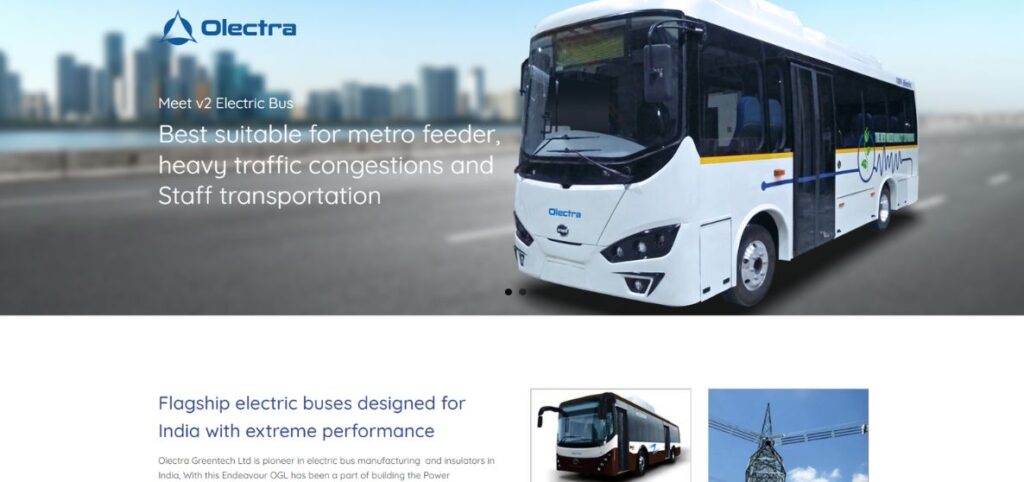
Hyderabad-based Electra Greentech also falls on this list right from the beginning to start manufacturing electric buses in this country. Electra is an Indian associate of BYD, the world’s largest electric vehicle company, and the company offers a range of electric buses including the eBuzz models. They are long-distance buses and they’ve also been established to be very reliable and also have very efficient batteries for both urban and regional use. The company’s emphasis on environment-friendly solutions has helped to minimize the country’s dependence on fossil fuel, Olectra noted.
Key Features:
- The first electric bus manufacturing firm in India
- Having BYD, the global leader in EV, as its partner
- It is widely used for its effectiveness in its operations and the few negative effects it has on the environment.
- Models fitted with long-range lithium-ion batteries
Popular Models:
Olectra v2, Olectra x2, iX Electric Bus, CX2 Electric Coach
4. JBM Auto
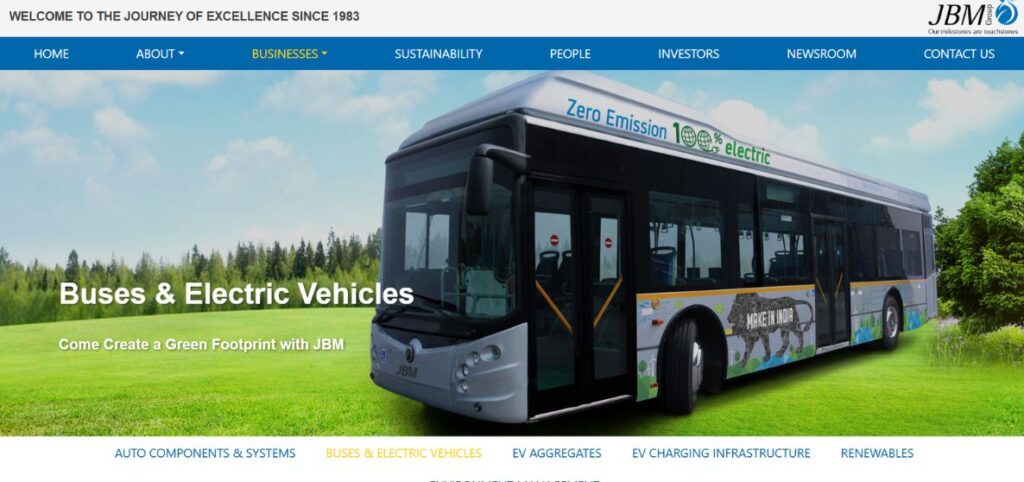
JBM Auto is already serving the Indian Electric bus market and provides long-lasting and efficient electric Buses for public transportation. Delhi NCR-based JBM manufactures buses such as the Eco-Life series which comes with choices of various bus lengths and floor designs. JBM lays its emphasis on sustainability and reliability which makes it a significant contender for electric vehicle production. Their buses offer superior comfort and cut emissions helping make cities cleaner across India.
Key Features:
- Large production capacity in Delhi NCR
- Focus on sustainable mobility with eco-friendly technology
- Subsidiary JBM Electric Vehicles supports EV financing initiatives
- Produces electric buses for varied transit applications
Popular Models:
JBM Eco.Life, e12 Galaxy, ecoLIFE 9m, ecoLIFE 12m
5. PMI Electro Mobility
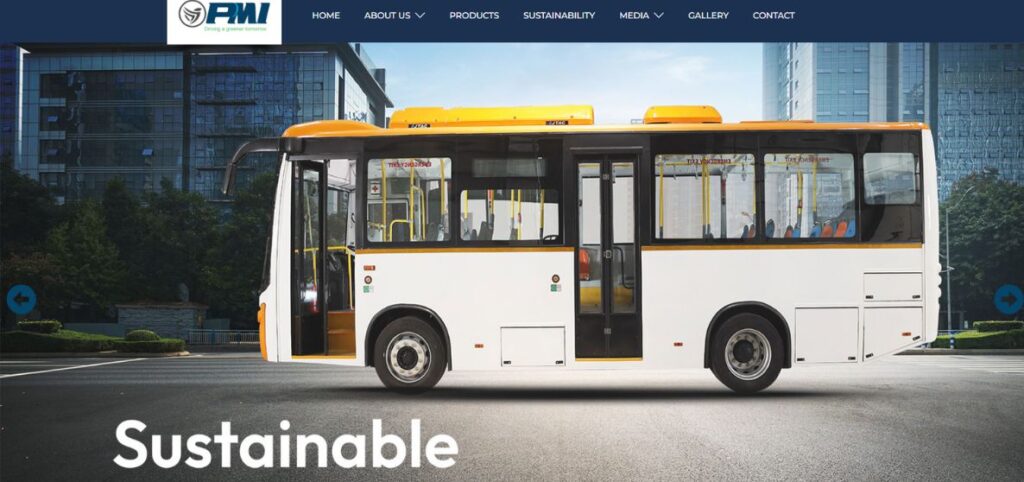
PMI Electro Mobility has emerged as a leading brand for manufacturing electric buses in India. Famous for its long-lasting designs and the latest lithium-ion battery, the company’s models include the Urban and Regio series with up to 180 km range. PMI buses are currently running in cities such as Delhi, Kerala, and Nagpur through its efficient passenger transport services where the primary goal is providing safe, efficient, and environmentally friendly commuters.
Key Features:
- Strong presence in cities across India
- Buses offer up to 180 km range on a single charge
- Focus on passenger experience and sustainability
- Known for Mohalla Buses initiative in Delhi for last-mile connectivity
Popular Models:
Urban (12M), Regio (9M), Lito (7M), School Buses (9M)
6. Erisha Mobility
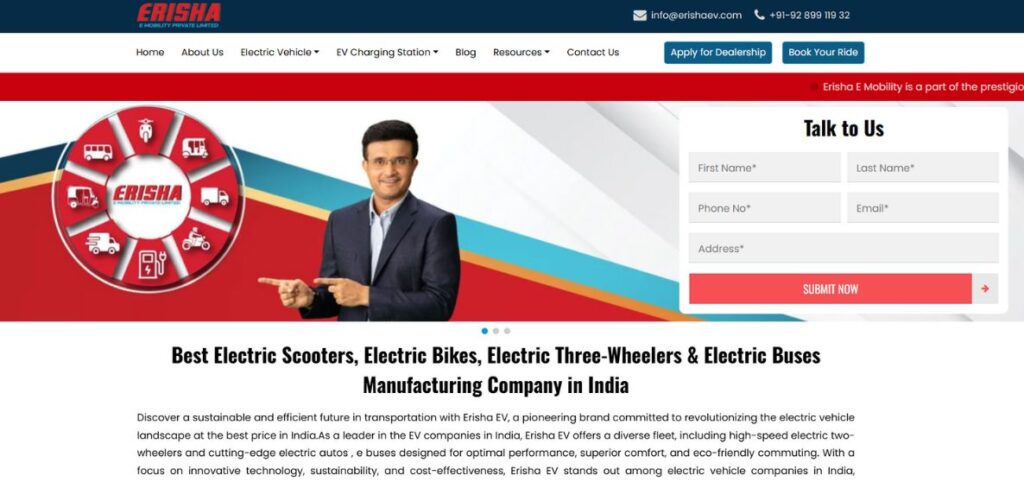
Erisha Mobility is a company that was founded in 2022 under the Rana Group it entered the EV market with this electric bus model and others. They also provide low-floor buses with ranges appropriate for both short and long-distance operations. Erisha’s team has employed modern designs in their models and uses environmentally conscious technology that will make EVS affordable in India and usher in the use of clean vehicles in the country.
Key Features:
- Offers a variety of electric bus sizes
- Lightweight, efficient designs
- Focus on electric mobility solutions for diverse transport needs
- Parent company Rana Group’s robust industrial backing
Popular Models:
Low Floor Electric Bus 7m, Erisha 9m, Erisha 12m, Erisha 13.5m
7. BYD Auto
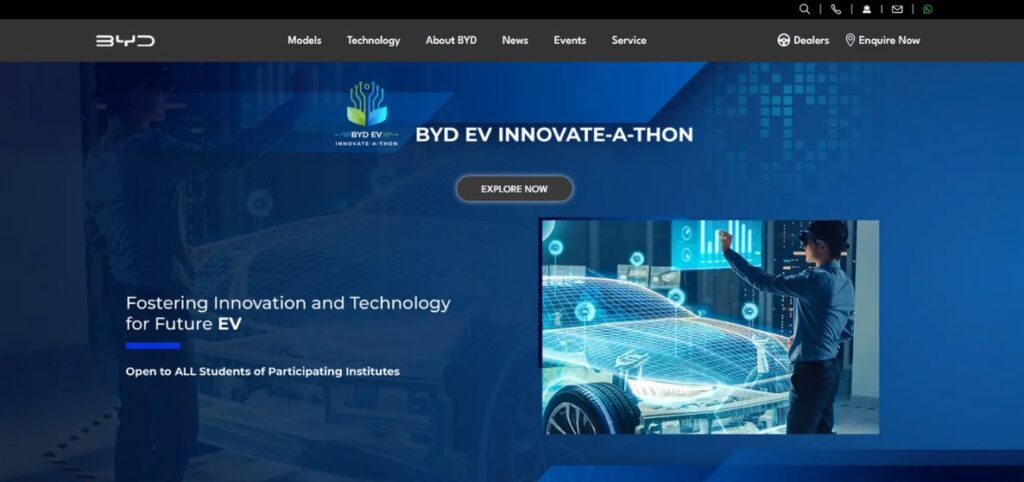
eBuzz series with high efficiency and eco-friendliness was launched globally by BYD Auto, a leading new energy automobile manufacturer that has cooperated with Olectra in India. Formerly a battery maker, BYD entered the electric buses market by offering battery-swapped lithium-ion batteries with high-powered motors. Some of BYD’s buses are eBuzz K6-300 and K9- 290, which can provide a reliable range in both city and intercity routes to minimize pollution in Indian cities and shift to electric public transport.
Key Features:
- High power and torque with advanced Li-ion batteries
- Durable monocoque chassis for safety and comfort
- Established manufacturing through collaboration with Electra
- Models offer up to 200 km range on a single charge
Popular Models:
E.Buzz K6, E.Buzz K7, E.Buzz K9, E.Buzz C9
8. Volvo Group
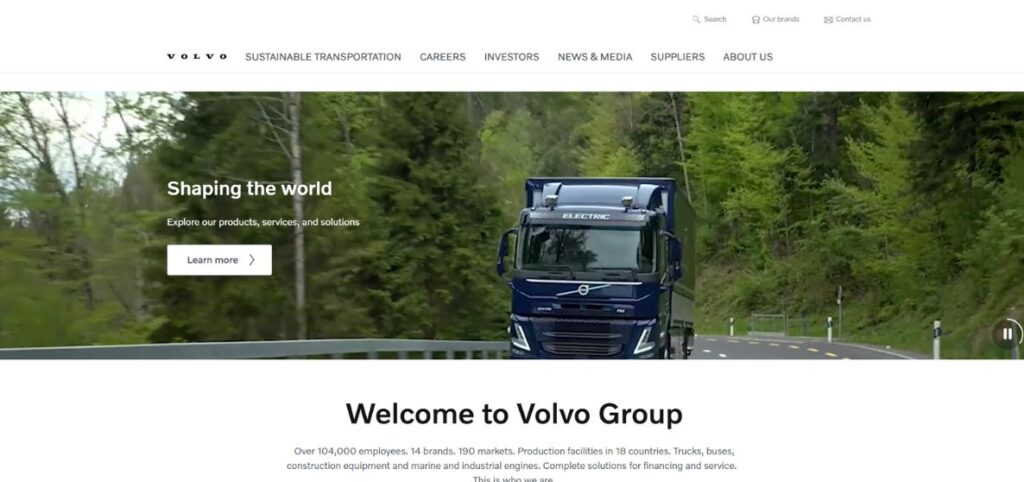
Swedish auto major Volvo Group provides state-of-the-art electric buses for operation on Indian roads. As for today, Volvo is associated with comfort and safety; its models such as the 7900 Electric do the same. Even though at present Volvo has few electric models in India, its buses are known for their efficiency, low emission levels, and energy conservation. This is where Volvo’s sustainable and safe transport solution is a perfect fit for India’s green transport initiative agenda.
Key Features:
- High-performance electric buses for urban transport
- Extended electric capabilities for hybrid models
- Global expertise in EV technology
- Durable designs for high passenger capacities
Popular Models:
Volvo 7900 Electric, Volvo 8900 Electric
9. Ashok Leyland
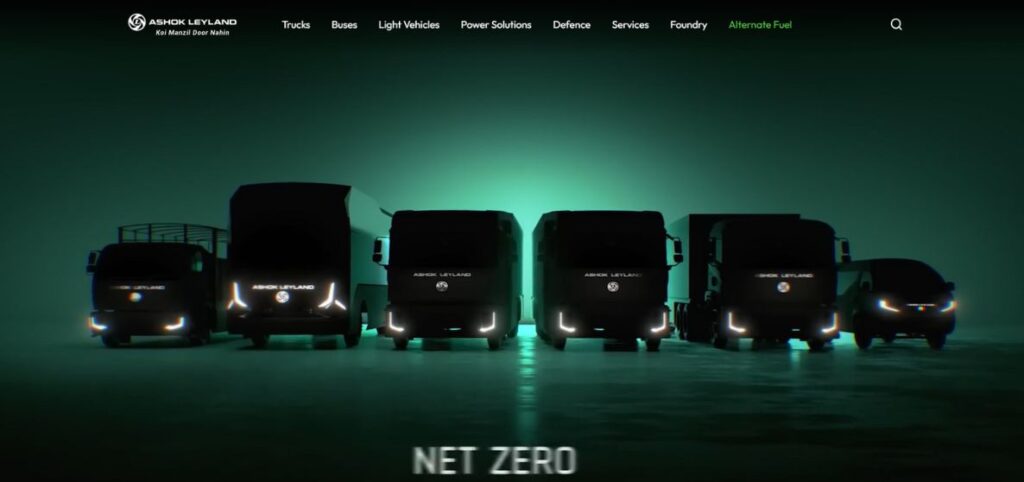
Innovations have struck again with the Circuit.S model from Ashok Leyland, an Indian manufacturer that has built a reputation for its electric buses. This approach allows for fast battery swaps, minimizing refueling time and enhancing the most critical element of a route. Ashok Leyland concentrates on the Indian roads and transportation requirements, offering economical and feasible green products, thus, aiding India in its mission to transform public transport green.
Key Features:
- Swappable battery design for quick recharging
- Focus on smart solutions for smart cities
- Designed for Indian conditions with a seating capacity of 25-35
- New manufacturing facility dedicated to electric buses
Popular Models:
Circuit.S, Smart City Bus
10. Eka Mobility
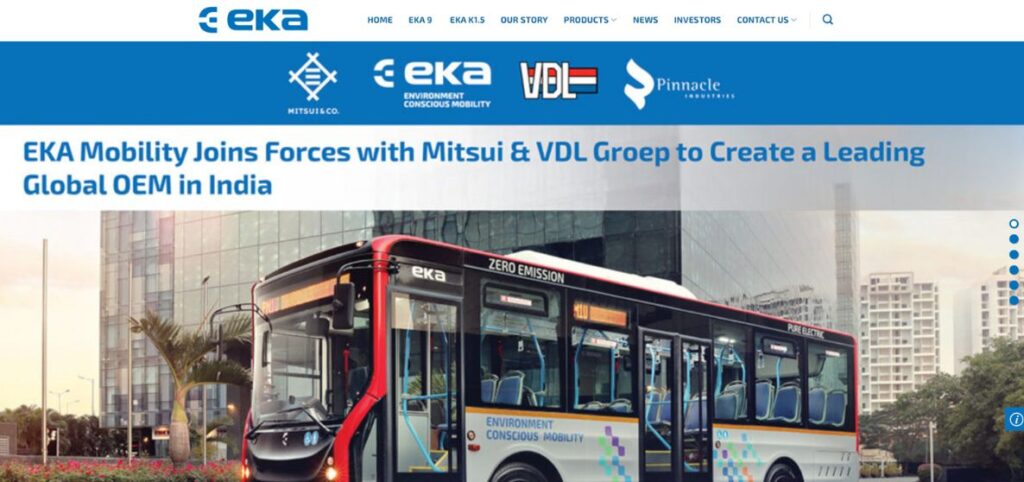
Eka Mobility, one of the relatively young companies operating in the Indian EV market provides its signature electric bus the Eka E9. This 9-meter bus constructed specifically for city conditions is economical in energy consumption and passenger capacity. Eka specializes in making environmentally sustainable automobiles with low cost of operations and high outcomes. With cost-friendly electric buses, Eka helps India build the green mobility future it has planned as efficient public transport systems.
Key Features:
- Emphasis on eco-friendly designs and low TCO
- Efficient seating and legroom for passenger comfort
- Quick charging capabilities (60-90 minutes)
- Strong market presence with expansion plans
Popular Models:
Eka E9
Conclusion
New generation electric buses are gradually dominating the Indian market as the manufacturers strive to improve their products to suit the Indian market and sustainability framework. Switch Mobility, Tata Motors, and JBM Auto, among other firms, are using their experience and sound manufacturing systems to deliver efficient, environmentally friendly transit solutions to Indian cities. Existing players like Olectra Greentech, associated with BYD technology, have been constantly striving to innovate at the battery front and optimize bus operations to make electric buses a reality for both intra-city as well as inter-city segments. PMI Electro and Erisha Mobility with a variety of models that focus on the range offer models that fit the demand of different types of transit.
The original incumbents in the commercial vehicle market like Ashok Leyland and Volvo are instead concentrating on areas that make electric buses more realistic for mass transit like swappable batteries and features for better comfort. At the same time, new entrants like Eka Mobility are also playing their part by bringing models that meet the Indian government’s goal of affordable clean mobility for everyone.
Combined, these companies are pushing a massive transition towards sustainable public transport in India. From combating pollution and discouraging dependence on fossil fuel, electric bus manufacturers are contributing to a sustainable, healthy India, one electric mile at a time.
FAQs
1. Which electric bus models are used most frequently in India?
Some of the well-known models used in city as well as intercity transport include Switch EiV 12, Tata Ultra 9m, and JBM Eco. Life.
2. What is the price of an electric bus in India?
Its price differs from one make to the other and from one model to another, and it is generally within the range of ₹60 lakhs – ₹1 Crore and above.
3. Can electric buses be useful for intercity transport?
Yes, some models such as Tata’s Starbus EV and Volvo’s 8900 Electric are for intercity routes which as we know require more battery charging capability.
4. Which electric bus has the highest range?
All BYD’s models, including the E.Buzz K9, have an option to travel up to 200 km on a single charge, which allows longer trips.
5. How can battery swap technology be implemented?
Ashok Leyland’s Circuit.S enables the bus to swap depleted batteries with charged ones at different stations hence cutting on time.
